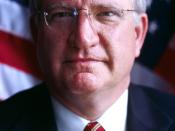The legalization of marijuana has recently been a rather controversial issue, although there should be no issue at all. Marijuana should be legalized. Prohibition was once tried with alcohol and it was proven that it does not work in any manner, and it should soon be proven again with marijuana. Some reasons why marijuana should be legal include there are numerous medical benefits, its creates a very harmful underground society, and prohibition costs very much money.
There is very much proof that shows the legalization of marijuana would have more of a positive impact on society than a negative one. This includes the elimination of the underground society, which mostly consists of drug dealers and consumers. There is also money involved, which is the money spent on trying to prevent the use of drugs and prosecute drug offenders. Medical reasons should also be accounted for which include the need for medical marijuana for patients to live without pain.
One significant unfortunate consequence of the increasing war on drugs is not allowing sick people to use marijuana as medicine. Prohibitionists insist that marijuana is not good medicine, or at least that there are legal alternatives to marijuana that are just as good. Those who believe that individuals should make their own decisions, not have their decisions made for them by politics and the law, would simply say that it's a decision for patients and their doctors to make. There is even good medical evidence about the therapeutic value of marijuana, despite the difficulty of doing sufficient research on an illegal drug. A recent National Institutes of Health panel concluded that smoking marijuana may help treat a number of conditions, including nausea and pain. It can be especially effective in improving the appetite of AIDS and cancer patients. The drug could
also assist people who for some reason do not respond to usual treatments. More than 70 percent of U.S. cancer specialists in one survey said they would prescribe marijuana if it was legal, and almost half said they had urged their patients to break the law to get hold of the drug. The British Medical Association says that nearly 70 percent of its members believe marijuana should be available for therapeutic use. Even President George Bush's Office of Drug Control Policy criticized the Department of Health and Human Services for closing its special medical marijuana program and leaving users to resort to the unsafe underground society (Boaz).
The prohibition of marijuana has created an underground economy that feeds off violence and greed. This economy seems to offer satisfaction and riches for those who decide on joining it, although it leaves more people dead or in jail than not. Total drug arrests are now over 1.5 million a year. There are about 400,000 drug offenders in jails and prison now. Over 80 percent of the increase in the federal prison population from 1985 to 1995 was due to drug convictions. Drug offenders made up 59.6 percent of all federal prisoners in 1996. Which is up from 52.6 percent in 1990. Drug dealers become the most clearly successful people in these communities. They are the ones with the money, clothes, and cars. Social order is turned upside down when the most successful people in a community are criminals. The drug war makes peace and prosperity almost impossible in inner cities (Boaz). Legalization of marijuana would bring with it government controls. This would guarantee a safe supply of marijuana that is free of any unknown substances. It would also provide a known and consistent potency and price, rather than force users to deal with the underground economy. This is just like how alcohol, tobacco and over the counter and prescription drugs are regulated. There would also be the added bonus of drug tax revenue. (Kalet)
Drug prohibition is a great example of throwing money at a problem. The federal government spends over $16 billion to enforce drug laws every year. Which is all to little success. Total federal expenses for the first 10 years of Prohibition added up to $88 million, and about $733 million since 1993. Drug enforcement cost about $22 billion in the Reagan years and another $45 billion in the four years of the first Bush administration. The federal government spent $16 billion on drug control programs in 1998 and has approved a budget of $17.9 billion for 1999. The Office of National Drug Control Policy reported in April 1999 that state and local governments spent another $15.9 billion in 1991. Which was an increase of 13 percent over 1990, and there is every reason to believe that state and local expenses have risen to this day. Other expenses include the numerous anti-drug advertisements and funding for jailing since the majority of convicted criminals are drug offenders. (Boaz)
Barry McCaffrey states in his article that decriminalizing drug use would have serious consequences. According to McCaffrey, drug use is associated with higher rates of violence and child abuse, and increasing the availability of drugs would make such problems much worse. In actuality having drugs illegal causes more violence due to the crimes committed by the underground community. It is also commonly argued that addicts would be less likely to receive treatment if drugs were no longer illegal, because they would not be forced to by the law, but it would be more meaningful if it was done for one's self and not for the law. Many people think that the United States should not encourage "risky and self-destructive" behavior by legalizing marijuana of any sort, although it has a calming effect on most users.
( McCaffrey).
Ending the prohibition on marijuana would save us money, help prosper the medical field, and eliminate an unsafe underground community. The legalization of marijuana would have a very great and positive impact on today's society. Voters and congress alike, must learn of these benefit's which the end of marijuana prohibition would bring. The more people that realize this, the further we are on bettering our society.
Works Cited
Boaz, David, "Drug Prohibition is Counterproductive", Greenhaven Press, 2000, Opposing Viewpoints.Galenet, NOHS Media Center, Feb. 14, 2005,
Kalet, Hank, "Drug Policies Should be Liberalized", Greenhaven Press, 2000, Opposing Viewpoints.Galenet, NOHS Media Center, Feb. 14, 2005,
McCaffrey, Barry, "Drug Use Should Not be Decriminalized", Greenhaven Press, 2003, Opposing Viewpoints.Galenet, NOHS Media Center, Feb. 14, 2005,


